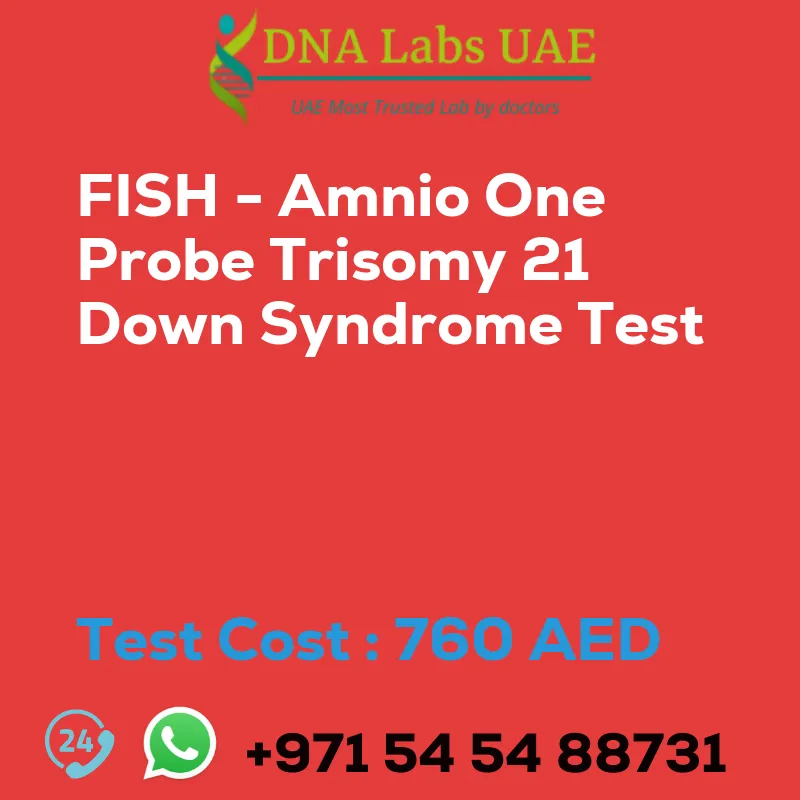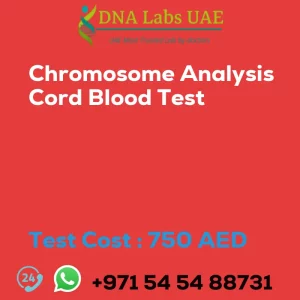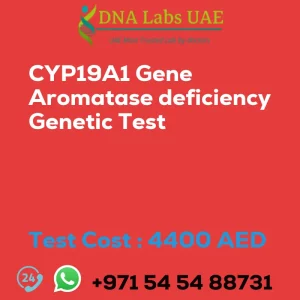FISH – AMNIO ONE PROBE TRISOMY 21 DOWN SYNDROME Test
Test Name: FISH – AMNIO ONE PROBE TRISOMY 21 DOWN SYNDROME Test
Components: Price – 760.0 AED
Sample Condition: 10 mL (7 mL min.) Amniotic fluid in a sterile screw capped container. Ship at 18-22°C. DO NOT FREEZE. Sample to be taken after 15 weeks gestation. Duly filled Prenatal Genetic Testing Consent Form (Form 18) & Chromosome & FISH analysis Requisition Form (Form 17) is mandatory.
Report Delivery: Sample Daily by 4 pm; Report 4 days
Method: FISH
Test type: Prenatal Diagnosis
Doctor: Gynecologist
Test Department: CYTOGENETICS
Pre Test Information: Sample to be taken after 15 weeks gestation. Duly filled Prenatal Genetic Testing Consent Form (Form 18) & Chromosome & FISH analysis Requisition Form (Form 17) is mandatory.
Test Details
The FISH – Amnio One Probe is a diagnostic test used to detect Trisomy 21, also known as Down syndrome. Trisomy 21 is a genetic disorder characterized by the presence of an extra copy of chromosome 21.
This test involves analyzing cells obtained from amniotic fluid, which surrounds the fetus in the womb. During the procedure, a small amount of amniotic fluid is extracted using a needle inserted into the mother’s abdomen. The fluid contains fetal cells that can be analyzed for chromosomal abnormalities.
The FISH – Amnio One Probe uses a technique called fluorescence in situ hybridization (FISH) to identify the presence of an extra chromosome 21. In FISH, a specific probe is used to target and bind to the chromosomes of interest. In this case, the probe is designed to bind to chromosome 21. The probe is labeled with a fluorescent dye that emits light when exposed to a specific wavelength. If there is an extra copy of chromosome 21, the probe will bind to it and emit a fluorescent signal, indicating the presence of Trisomy 21.
The FISH – Amnio One Probe test is commonly performed during the second trimester of pregnancy, typically between 15 and 20 weeks. It is an invasive procedure and carries a small risk of complications, including infection or injury to the fetus. Therefore, it is usually recommended for women who have an increased risk of having a baby with Down syndrome based on other screening tests or maternal age.
It is important to note that the FISH – Amnio One Probe test is a screening test, not a definitive diagnosis. If the test results indicate a positive finding for Trisomy 21, further confirmatory testing, such as a karyotype analysis or chromosomal microarray, may be recommended to confirm the diagnosis.
| Test Name | FISH – AMNIO ONE PROBE TRISOMY 21 DOWN SYNDROME Test |
|---|---|
| Components | |
| Price | 760.0 AED |
| Sample Condition | 10 mL (7 mL min.) Amniotic fluid in a sterile screw capped container. Ship at \n18-22?\u00f8C. DO NOT FREEZE. Sample to be taken after 15 weeks gestation. Duly filled Prenatal Genetic Testing Consent Form (Form 18) & Chromosome & FISH analysis Requisition Form (Form 17) is mandatory. |
| Report Delivery | Sample Daily by 4 pm; Report 4 days |
| Method | FISH |
| Test type | Prenatal Diagnosis |
| Doctor | Gynecologist |
| Test Department: | CYTOGENETICS |
| Pre Test Information | Sample to be taken after 15 weeks gestation. Duly filled Prenatal Genetic Testing Consent Form (Form 18) & Chromosome & FISH analysis Requisition Form (Form 17) is mandatory. |
| Test Details |
The FISH – Amnio One Probe is a diagnostic test used to detect Trisomy 21, also known as Down syndrome. Trisomy 21 is a genetic disorder characterized by the presence of an extra copy of chromosome 21. This test involves analyzing cells obtained from amniotic fluid, which surrounds the fetus in the womb. During the procedure, a small amount of amniotic fluid is extracted using a needle inserted into the mother’s abdomen. The fluid contains fetal cells that can be analyzed for chromosomal abnormalities. The FISH – Amnio One Probe uses a technique called fluorescence in situ hybridization (FISH) to identify the presence of an extra chromosome 21. In FISH, a specific probe is used to target and bind to the chromosomes of interest. In this case, the probe is designed to bind to chromosome 21. The probe is labeled with a fluorescent dye that emits light when exposed to a specific wavelength. If there is an extra copy of chromosome 21, the probe will bind to it and emit a fluorescent signal, indicating the presence of Trisomy 21. The FISH – Amnio One Probe test is commonly performed during the second trimester of pregnancy, typically between 15 and 20 weeks. It is an invasive procedure and carries a small risk of complications, including infection or injury to the fetus. Therefore, it is usually recommended for women who have an increased risk of having a baby with Down syndrome based on other screening tests or maternal age. It is important to note that the FISH – Amnio One Probe test is a screening test, not a definitive diagnosis. If the test results indicate a positive finding for Trisomy 21, further confirmatory testing, such as a karyotype analysis or chromosomal microarray, may be recommended to confirm the diagnosis. |








